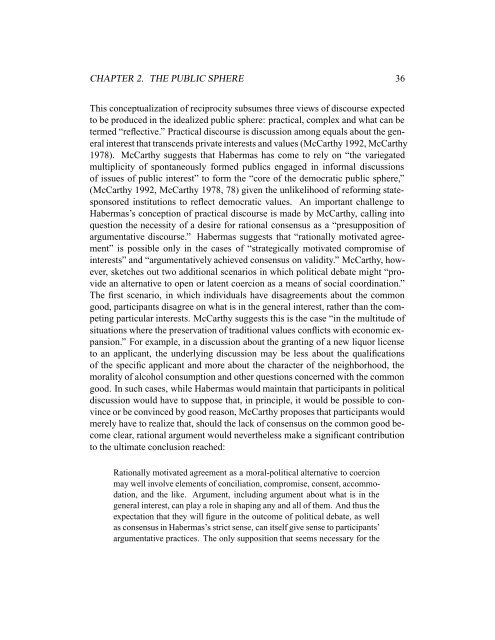Expanding the Public Sphere through Computer ... - ResearchGate
Expanding the Public Sphere through Computer ... - ResearchGate
Expanding the Public Sphere through Computer ... - ResearchGate
You also want an ePaper? Increase the reach of your titles
YUMPU automatically turns print PDFs into web optimized ePapers that Google loves.
CHAPTER 2. THE PUBLIC SPHERE 36<br />
This conceptualization of reciprocity subsumes three views of discourse expected<br />
to be produced in <strong>the</strong> idealized public sphere: practical, complex and what can be<br />
termed “reflective.” Practical discourse is discussion among equals about <strong>the</strong> general<br />
interest that transcends private interests and values (McCarthy 1992, McCarthy<br />
1978). McCarthy suggests that Habermas has come to rely on “<strong>the</strong> variegated<br />
multiplicity of spontaneously formed publics engaged in informal discussions<br />
of issues of public interest” to form <strong>the</strong> “core of <strong>the</strong> democratic public sphere,”<br />
(McCarthy 1992, McCarthy 1978, 78) given <strong>the</strong> unlikelihood of reforming statesponsored<br />
institutions to reflect democratic values. An important challenge to<br />
Habermas’s conception of practical discourse is made by McCarthy, calling into<br />
question <strong>the</strong> necessity of a desire for rational consensus as a “presupposition of<br />
argumentative discourse.” Habermas suggests that “rationally motivated agreement”<br />
is possible only in <strong>the</strong> cases of “strategically motivated compromise of<br />
interests” and “argumentatively achieved consensus on validity.” McCarthy, however,<br />
sketches out two additional scenarios in which political debate might “provide<br />
an alternative to open or latent coercion as a means of social coordination.”<br />
The first scenario, in which individuals have disagreements about <strong>the</strong> common<br />
good, participants disagree on what is in <strong>the</strong> general interest, ra<strong>the</strong>r than <strong>the</strong> competing<br />
particular interests. McCarthy suggests this is <strong>the</strong> case “in <strong>the</strong> multitude of<br />
situations where <strong>the</strong> preservation of traditional values conflicts with economic expansion.”<br />
For example, in a discussion about <strong>the</strong> granting of a new liquor license<br />
to an applicant, <strong>the</strong> underlying discussion may be less about <strong>the</strong> qualifications<br />
of <strong>the</strong> specific applicant and more about <strong>the</strong> character of <strong>the</strong> neighborhood, <strong>the</strong><br />
morality of alcohol consumption and o<strong>the</strong>r questions concerned with <strong>the</strong> common<br />
good. In such cases, while Habermas would maintain that participants in political<br />
discussion would have to suppose that, in principle, it would be possible to convince<br />
or be convinced by good reason, McCarthy proposes that participants would<br />
merely have to realize that, should <strong>the</strong> lack of consensus on <strong>the</strong> common good become<br />
clear, rational argument would never<strong>the</strong>less make a significant contribution<br />
to <strong>the</strong> ultimate conclusion reached:<br />
Rationally motivated agreement as a moral-political alternative to coercion<br />
may well involve elements of conciliation, compromise, consent, accommodation,<br />
and <strong>the</strong> like. Argument, including argument about what is in <strong>the</strong><br />
general interest, can play a role in shaping any and all of <strong>the</strong>m. And thus <strong>the</strong><br />
expectation that <strong>the</strong>y will figure in <strong>the</strong> outcome of political debate, as well<br />
as consensus in Habermas’s strict sense, can itself give sense to participants’<br />
argumentative practices. The only supposition that seems necessary for <strong>the</strong>
















